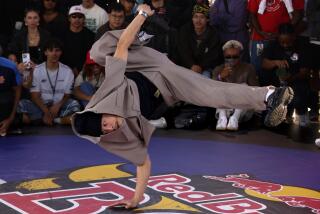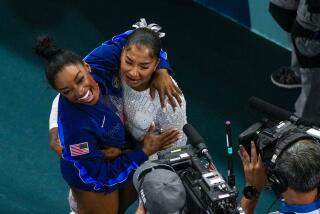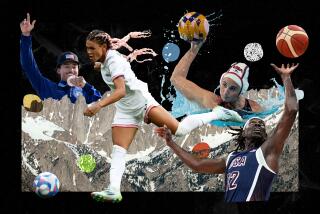Soviet Team Muscles Into County : Bodybuilders Have Uplifting Time Working Out, Shopping and Eating
FULLERTON — The advanced machinery and bright lighting of Gold’s Gym here were as dazzling to the Soviet national bodybuilding team as the sun and ocean at Newport Beach.
After having had to practice their sport in secret until two years ago, when bodybuilding first received official government sanction, the Soviet bodybuilders were clearly in their glory Monday.
But it wasn’t just the high-tech gym that left them overwhelmed. It also was getting chances Sunday and Monday to do things unremarkable to the average Southern Californian but exotic to them--visiting Newport Beach and Disneyland, shopping at South Coast Plaza and eating prodigious amounts of food at Denny’s.
As the team members were consuming pancakes, eggs, sausage and bacon after their morning workout, they agreed that American food is much better than anything available to them in their homeland. They liked it so much, in fact, that several ordered seconds.
Today, the 25-member entourage leaves for San Francisco, where the athletes will participate in an exhibition with American bodybuilders on Wednesday.
“They walked in here . . . and their jaws dropped,” said Vodak Hawkins, owner of Gold’s Gym.
Nothing equivalent to Gold’s exists in the Soviet Union. In fact, before they received the official sanction, the bodybuilders worked out in the basements of their apartment complexes.
“If it wasn’t officially sanctioned; they were not supposed to be doing it,” said Russell Valentino, interpreter for the 25-member Soviet team. “And although probably no one was persecuted for it or went to jail, it was strongly discouraged.”
Phil Smith, producer of the ESPN “Muscle Magazine” show, brought the Soviets to the United States for the San Francisco exhibition, which will be televised at a later date.
Smith, who traveled to the Soviet Union in March, 1988, for a show about Soviet bodybuilders, said the equipment there appeared to him to be homemade.
“We feel like we’re very behind,” said Ain Paavo through the team’s interpreter. Paavo is a member of the Soviet team and also a European champion. “We have the same machines, they’re just 20 years older.”
Many of the Soviet bodybuilders, Smith said, first competed in other sports and took up bodybuilding after being sidelined by injuries.
Paavo, for instance, was a weightlifter before he broke his left arm. Team member Nikolai Grishanov is a former Olympic weightlifting champion who bears a large scar on his right knee, the result of an injury that ended that career.
Smith said bodybuilding is a low-impact sport that injured Soviet athletes often use for rehabilitation.
But now that the sport has government approval, Soviet athletes have other motives to train.
Enna Uit, the only woman on the Soviet team, is officially employed as an athletic trainer, as are most of her teammates. But with perestroika, Uit is now allowed to make her living as a bodybuilder. She estimates that as many women as men compete in bodybuilding in the Soviet Union.
Over their generous American breakfasts, the athletes talked about other conditions in their homeland.
Uit, a native of the republic of Estonia, said she lives and trains under a strict food-rationing system not conducive to building muscle quickly.
Eugene Gorelik, a team member from Vilnius, Lithuania, lives under similar conditions. “It is very difficult there,” Gorelik said in English. “Now we have no food, no oil.”
Before breakfast, several team members went with Hawkins to the gift shop at Gold’s and traded Soviet T-shirts (white shirts with a red “CCCP” and hammer and sickle logo) for Gold’s Gym T-shirts and sweat suits.
After breakfast, Smith said, he was “going to blow their minds” by taking the team shopping at South Coast Plaza.
Many had only a few dollars. They window shopped, gazing with fascination at the artificial diamonds at May Co.
A few had enough money to buy some of the alluring American goods, however. One bodybuilder bought a leather skirt for his girlfriend.
Asked what he liked most about the United States so far, European champ Paavo first said the Pacific Ocean, then he said the food.
But then he added: “We knew that you lived well here. We didn’t know that there were such nice, friendly people here. Everybody goes around with a sourpuss on their face in the Soviet Union.”
More to Read
Go beyond the scoreboard
Get the latest on L.A.'s teams in the daily Sports Report newsletter.
You may occasionally receive promotional content from the Los Angeles Times.










